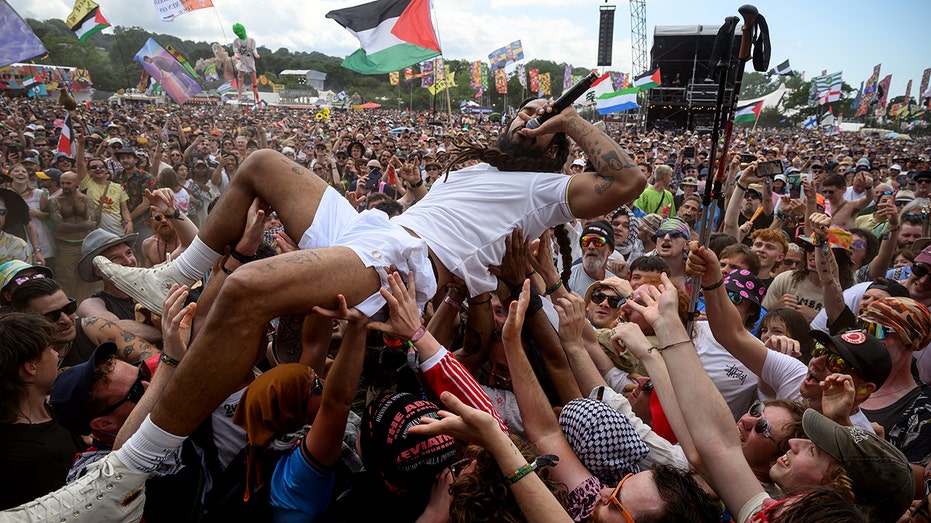
Jewish leaders in the United Kingdom have expressed outrage following antisemitic chants led by artists at the Glastonbury Festival, a major music event broadcast live on British public television. The incident highlights a broader concern over the alarming rise in antisemitism in the UK, which has been escalating since the Hamas attack on Israel on October 7, 2023.
The controversy erupted when British rap-pop duo Bob Vylan performed at the festival, with the lead singer chanting “Death, death to the IDF [Israel Defense Forces].” This incident has intensified fears within the Jewish community, who have long warned that they no longer feel welcome in the UK due to government inaction on antisemitism.
Rising Antisemitism in the UK
David Collier, an independent investigative journalist, commented on the situation, stating that the chants at Glastonbury did not emerge in isolation. “Bob Vylan’s chant didn’t come from an empty space,” Collier said. He emphasized that the crowd’s participation and the lack of intervention from the festival’s crew and the BBC, which continued its live coverage, signaled a troubling normalization of antisemitic rhetoric.
The Community Security Trust, which monitors antisemitic incidents across Great Britain, reported a surge in attacks against Jews, with 3,528 incidents in 2024 and 4,296 in 2023, marking the highest levels ever recorded.
“The end product was a team effort that shows just how blind mainstream U.K. has become to a genocidal antisemitic ideology,” Collier added.
Community Response and Government Inaction
In response to the growing threat, hundreds of people attended a protest organized by the National Jewish Assembly, the Campaign Against Antisemitism, and the UK Lawyers for Israel at the BBC Broadcasting House on October 16, 2023. The protest criticized the BBC’s refusal to label Hamas as terrorists, despite the group’s designation as a terrorist organization by the UK in March 2021.
A survey conducted by the Campaign Against Antisemitism in January 2025 revealed that only 34% of British Jews believe their community has a long-term future in the UK. Up to half of the respondents have considered leaving the country due to antisemitism, and less than half feel welcome in the UK. The survey also highlighted that 92% of British Jews perceive media bias against Israel as a key factor fueling antisemitism.
“Incitement to violence should be a red line which forces the British government and the BBC to take all measures possible against these artists,” said Sacha Roytman, CEO of the Campaign Against Antisemitism.
Political and Media Reactions
Britain’s Prime Minister Keir Starmer condemned the performance, stating, “There is no excuse for this kind of appalling hate speech” and called on the BBC to explain how the broadcast occurred. Meanwhile, Danny Cohen, a former BBC director, criticized the broadcaster for violating its guidelines on hate speech.
The Board of Deputies, representing British Jewry, issued a statement demanding answers from the BBC and condemning Glastonbury Festival for allowing its stage to be used for hate speech. Nicole Lampert, a UK-based journalist, pointed to the BBC as a significant contributor to the problem, citing its biased reporting on Middle Eastern conflicts.
“What happened at Glastonbury is a symptom of a sickness in British society,” Lampert said. “This starts with the BBC.”
Future Implications and Calls for Action
The incident at Glastonbury has sparked a broader debate on the role of media and government in addressing antisemitism. Israeli Minister for Diaspora Affairs Amichai Chikli urged British Jews to consider leaving the country, highlighting the severity of the situation.
The BBC, in a belated response, acknowledged the offensive nature of the performance and stated that it “should have pulled” the livestream. The British government has yet to respond to inquiries regarding their actions to combat antisemitism.
As tensions continue to rise, the Jewish community in the UK remains vigilant, calling for stronger measures to ensure their safety and security. The situation underscores the urgent need for a comprehensive approach to tackle antisemitism and foster a more inclusive society.






